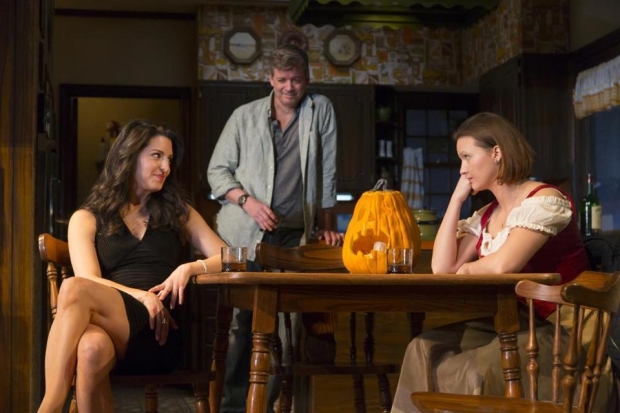Can You Forgive Her?
Huntington Stage Company stages this world-premiere play about women seeking the security of money in order to better navigate the perils of their lives.

(© T. Charles Erickson)
The Huntington Theatre Company has mounted a terrific production of Gina Gionfriddo's new wake-up drama Can You Forgive Her? Directed by Peter Dubois, this production's ensemble members nail their characters' desperation as well as the dark humor in their search for solutions to the disarray of their lives.
Can You Forgive Her? takes place on a single set of a rundown vacation house (expertly designed by Lauren Helpern) that conjures up the familiar musty smell of a summer rental. The play deals with two couples who come together on a long night's drunken journey into morning. Tanya is a single mother, plugging away at a dead-end job as a bartender that does not allow her to make ends meet. She is in love with Graham, a loser who avoids looking for a decent job. He has inherited a valuable beach house after his mother's passing, where he lives, unable to sort through the boxes of her papers in order to throw them out and move on. Tanya will not agree to marry him until he finds a "livelihood," as she puts it.
Enter Miranda, an accidental, upper-class princess carrying a debt of $200,000 that she can never repay. Her solution is to prostitute herself out twice a week to David, a wealthy, much older man. Her self-loathing is evident, as is her predicament, especially since David is also keeping company with a woman his own age whom he respects. Despite the business arrangement between them, Miranda is dismayed by David's new relationship. For consolation, she goes off with recent immigrant Sateesh on a weekend shopping spree. When the triangle between Miranda, David, and Sateesh erupts, Graham invites her to hide out at his house. David later arrives to rescue Miranda, as if to protect his investment, but he proves as emotionally depleted as the others.
Meredith Forlenza as Miranda is the fulcrum of the action in a performance no less forceful than a hurricane wind off the beach that rattles the windows and as well as the relationships. Model thin, dressed in a chic little black dress, and worrying her long hair back with continuing nervous gestures, Miranda is a take-charge woman, despite unresolved issues of her own. Like Tanya, who became pregnant by a heroin junkie and regrets her choices, Miranda has embarked on an unmarked road through the metaphoric woods. (And, yes, Gionfriddo quotes Robert Frost's poem as extra ballast among the sharply shaped dialogue of manipulation and regrets.)
Chris Henry Coffey plays the complexities of his character Graham, a man child who has relied on his charm and disregard of responsibility to get by, until now. Tanya Fischer is a resolute Tanya, determined to ensure her future even if she must leave Graham behind. Allyn Burrows delivers a poignant characterization as the emotionally-frozen David, gradually and reluctantly revealing his need for Miranda.
The title of Gionfriddo's perceptive drama about people who are no longer young, but not too old to look for change, is said to be taken from Anthony Trollope's novel about three women "weighing their options in terms of the men who are out there." However, Gionfriddo has also hit on one of the recurring conundrums of the age: how to find what you love and who you love while still being able to pay the bills as you fulfill those dreams. Though the questions explored in this play mostly remain unanswered, it's easy to forgive the talented Gionfriddo for setting up reflections of ourselves and tugging at our own fears of the future.











